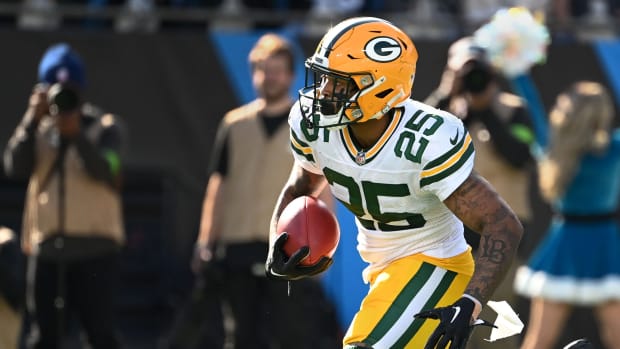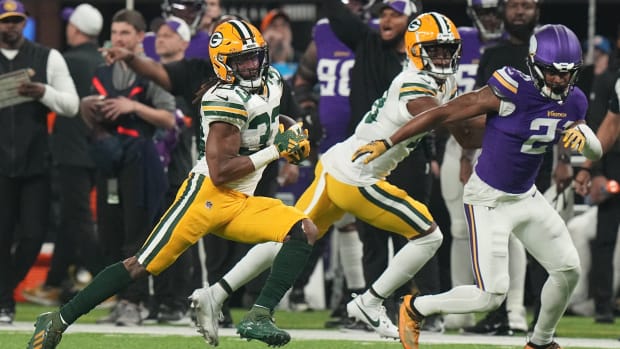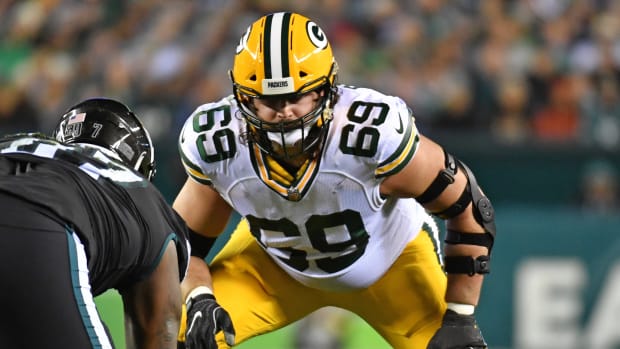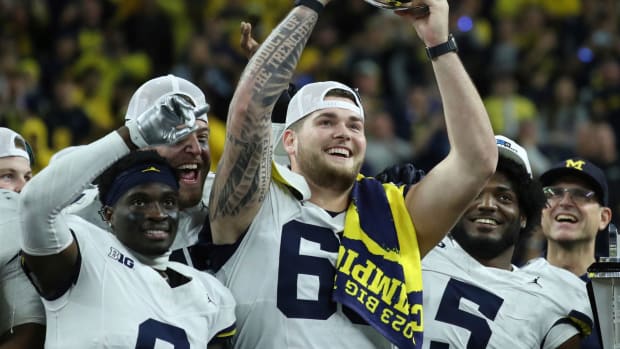NFC Playoffs Best and Worst: Passer Rating Differential
GREEN BAY, Wis. – The NFL is all about the quarterbacks. A great quarterback like Aaron Rodgers or Tom Brady gives his team a chance to win every game and every championship. Thus, it’s imperative to have answers against those quarterbacks.
A good way to look at that equation is through passer rating differential. It’s simple math: passer rating on offense vs. passer rating on defense. The top seven in that stat qualified for this year’s playoffs.
Teams that can defend the pass will have a big edge, especially in the NFC. Of the conference’s seven playoff quarterbacks, six finished in the top nine in passer rating, led by Rodgers at No. 1 for a second consecutive year.
Here’s a look at the NFC field.
No. 1: Green Bay Packers (13-4)
Offense: 107.6 (first). Defense: 87.1 (10th). Differential: 20.5 (fourth).
Noteworthy: With Rodgers, the Packers have always had a winning hand at quarterback. It’s the defense that’s been troublesome. Not this year. Led by the in-season addition of Rasul Douglas, Green Bay intercepted 18 passes – seven more than last year and its most since its incredible run of 30, 24 and 31 from 2009 through 2011. It finished fifth with 6.18 yards allowed per attempt. Now, presumably, they’ll get a lift with return of Jaire Alexander. After Week 1, Rodgers threw 37 touchdowns vs. two interceptions. Unstoppable Davante Adams had eight touchdowns in the final seven games and eight 100-yard games overall.
No. 2: Tampa Bay Buccaneers (13-4)
Offense: 101.4 (sixth). Defense: 85.2 (eighth). Differential: 16.2 (sixth).
Noteworthy: Tom Brady threw a league-high 43 touchdowns vs. 12 interceptions, a 3.58-to-1 ratio. The Bucs’ defense allowed 26 touchdowns vs. 17 interceptions, a 1.53-to-1 ratio. Is there a more under-the-radar Hall of Fame prospect than receiver Mike Evans, who is 8-for-8 in 1,000-yard seasons? He had a career-high 14 touchdowns this year. Tight end Rob Gronkowski has 14 touchdowns in 20 playoff games. With a solid secondary and excellent front, Tampa Bay yielded a fourth-ranked 5.97 yards per attempt. It hit the under on that in five of its final six games.
No. 3: Dallas Cowboys (12-5)
Offense: 105.1 (third). Defense: 76.2 (third). Differential: 28.9 (first).
Noteworthy: The Cowboys dominated the skies. Surrounded by a lot of skill, Dak Prescott threw 37 touchdowns vs 10 interceptions. That includes 12 touchdowns and zero picks the last three games. Dallas’ defense was excellent, and it wasn’t just the league-high total of 26 interceptions. The Cowboys ranked third with a 59.5 percent completion rate allowed and gave up less than 200 passing yards in four of the last five games. With Trevon Diggs (11 interceptions) and Micah Parsons (13 sacks), the Cowboys have two game-changers.
No. 4: L.A. Rams (12-5)
Offense: 101.7 (seventh). Defense: 84.2 (fifth). Differential: 17.5 (fifth).
Noteworthy: Matthew Stafford was second with 41 touchdowns but last with 17 interceptions. Cooper Kupp won the receiving triple crown by leading the league in receptions, yards and touchdowns and topped 90 yards in an incredible 16 of 17 games, and Odell Beckham added five scores upon his arrival. Including Rodgers’ 307 yards and two touchdowns, the Rams yielded six games of 300-plus passing yards – a big number considering defensive tackle Aaron Donald, outside linebackers Von Miller and Leonard Floyd, and cornerback Jalen Ramsey are marquee players. The Rams finished seventh in interception percentage and fifth in sack percentage, the lowest cumulating ranking in those categories.
No. 5: Arizona Cardinals (11-6)
Offense: 100.5 (eighth). Defense: 93.2 (19th). Differential: 7.3 (10th).
Noteworthy: Kyler Murray finished second in completion percentage (69.2) and eighth in passer rating (100.5). Receiver Christian Kirk and tight end Zach Ertz are top weapons but former All-Pro receiver DeAndre Hopkins won’t play in the wild card round as he recovers from a knee injury. Defensively, the Cardinals allowed only one 300-yard passing game all season. The secondary is good but the pass rush supplied by Markus Golden (11 sacks) and Chandler Jones (10.5 sacks) is what drives the bus. If J.J. Watt can add anything upon his return, look out.
No. 6: San Francisco 49ers (10-7)
Offense: 99.4 (ninth). Defense: 96.8 (25th). Differential: 2.6 (17th).
Noteworthy: Don’t sleep on Jimmy Garoppolo. He completed at least 70 percent of his passes and averaged at least 9.0 yards per attempt in three consecutive games. His 8.64 yards per attempt was good for second in the NFL. Receiver Deebo Samuel (1,405 yards and league-high 18.3 yards per catch) and tight end George Kittle are studs. Samuel is the most dangerous run-after-catch receiver in the game by a wide margin. Defensively, the secondary isn’t great (28th in interception percentage) but the pass rush is elite (third in sack percentage).
No. 7: Philadelphia Eagles (9-8)
Offense: 89.1 (18th). Defense: 95.1 (23rd). Differential: minus-6.0 (22nd).
Noteworthy: With the best running game in the NFL, Jalen Hurts hasn’t had to carry the load with the passing game. He did have 326 yards vs. Dallas and 387 yards vs. Kansas City, though, so it’s not as if he’s incapable. Cornerback Darius Slay, a four-time Pro Bowler, led the way with three interceptions and nine passes defensed. However, the Eagles are 31st in sack percentage.




